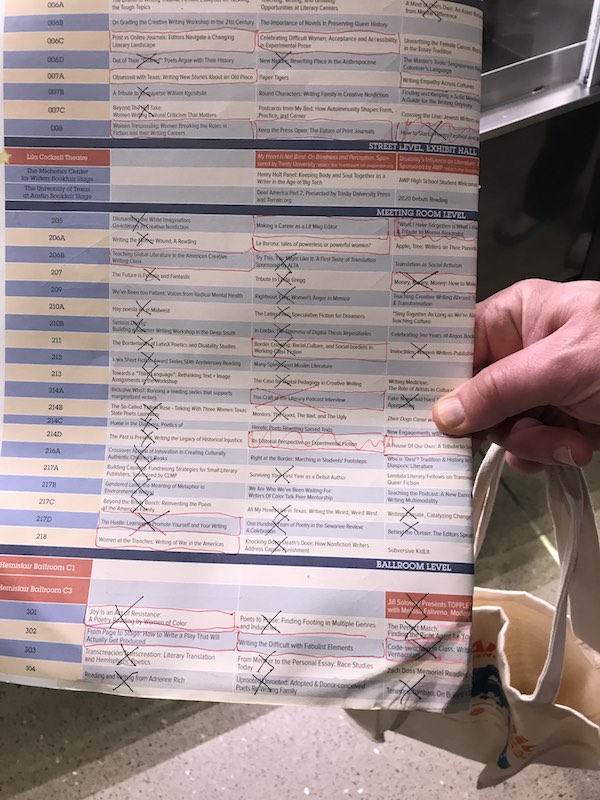Lit in the Time of Coronavirus
From emerging writer to potential vector at AWP in San Antonio
By Mark Gozonsky, 1:00AM, Thu. Mar. 12, 2020
This is a story where we don’t know how it ends.
It starts in August 1972, my dad sealing the deal on a used two-tone cobalt/sky blue Cutlass while my mom and sisters and I sit inside on vinyl-covered bench seats, my mom protesting the very premise of “(If Loving You is Wrong) I Don’t Want to be Right” by Luther Ingram.

Soooooooo hot in San Antonio, a whole new experience of heat. Ninety degrees is not hot anymore, as it was on Long Island. 105 degrees is the new hot.
Cicada bleat is the new sound.
Spanish moss is the new texture.
My Long Island Jewish family has become Texan.
And then 45 years pass. I make plans to come to the Association of Authors and Writers Programs (AWP) conference because it is being held in San Antonio and my Texanhood has compressed to ever-present background loops of “London Homesick Blues” alternating with “Dublin Blues.” Whatever happens at this conference in San Antonio – literary people being nice to me, literary people not being nice to me, and vice versa – when it is over, I am sitting down with old friends at the Chili Parlor Bar, drinking mad dog margaritas and wondering if my attending this festival from motives rooted in the deepest heart of my love for Texas will mutate into making me a vector in the coronavirus pandemic.
I have been to two other AWP conferences: Los Angeles, 2016; Washington, D.C., 2017 – that one was a month after Trump’s inauguration. You could say these things are always fraught because writers are so sensitive, but this one right now, right here in San Antonio is – to remain calm as epidemiologists recommend – especially fraught.

There must have been a fine workshop scheduled on the topic of crafting description; however, I bet it was canceled. It’s a crapshoot whether any given workshop or panel or reading here has been canceled; you could check the app, but it’s depressing. You hear about attendees spontaneously doing their own panels based on whoever shows up – audience as presenter. Sounds iffy. Personally, I have already attended one perfect panel about the intersection of creative writing and medical science, so now I am doing that probably gauche thing of writing at a writing conference.
I am sitting in an out-of-the-way nook of the Henry B. Gonzalez Convention Center, and it is beautiful here in this nook. Roomy, airy; leather-backed steel-tubed chairs at graciously spaced tables; a woman writing at that one in front of me, a guy writing at that one next to me, we are together in the same place doing the same thing amid stark shadows thrown down by floor to ceiling windows looking out upon leafless trees that are not live oaks and a multicultured mural representing the variety of Texas cultures.
All this plus light, light, light, light, light. At the writer’s conference I went to last year instead of AWP, Arizona State’s “Desert Nights, Rising Stars,” Yohanca Delgado gave a craft talk on description in which she advised noting where the light is coming from and what it is doing. She had the stately bearing of someone who knows, and I bear this advice away with me and am spreading it now like I may be spreading coronavirus when I get home. One does hear black humor: “I’m going to infect Kansas City. She’s going to infect Chicago,” said one of the smartest and most talented people I have met here at this conference.
In this room, here and now, the sunlight from over the mural of Texan cultures is etching backward capital "E"s inside of the floor-to-ceiling windows; the effect evidently a reflection from the graceful staircase’s aluminum-tube handrails and thick-slab acrylic balustrade.
“Backward capital 'E,' Backward capital 'E,' Backward capital 'E,'” signals the light in a spontaneous outbreak of Bauhaus lettering, akin to a room full of monkeys actually typing Hamlet. Backward Capital "E-E-E" stands for what you want it to stand for, what you truly believe. I truly believe those thick slabs of acrylic are also trying to tell us something. They are patterned dot-dot-dot-dot-dot-dot-dot, each dot about a quarter the size of a Twister dot, like the attendance here at this AWP is about a quarter the size of attendance at a regular AWP. The dot-dot-dots are really like bunches of grapes; they are more like bunches of grapes than they are like anything except the magnified coronavirus itself, round and unwanted but here and everywhere, dappling the crisp sharp clear brilliant welcome delightful beloved San Antonio sunshine.
I have made a note once I’m done describing to ask my fellow writers what they’re writing. Angela Morales, who teaches at Glendale Community College right near me back home in Los Angeles, is writing about the pros and cons of entering writing contests. For her, it’s mostly been pro: She entered one contest, the Riverteeth Book Prize, and won. Hooray for Angela! But this here conference has not been the victory lap she or anyone else anticipated. I, for example, was gonna do my dangedest to leverage getting two stories published in The Sun within the last six months into getting an agent and a three-book deal – aim high! – but The Sun, like all the other publishers of my most modest modicum of literary recognition – canceled.
“It’s got a spooked vibe,” Angela says. I concur, having just seen Twister-dot-sized microbes.
“This is going to turn out to have been a hot spot,” Angela continues to prophesy. “Not here at the Convention Center. They’re going a great job of keeping this place clean. But at my hotel, they don’t even have hand sanitizer out.”
Eeesh. My hotel is oozing hand sani. Hand sani and Lone Star. It’s been a festive couple of days. It occurs to me suddenly and I tell my new friend Angela, “So it’s like we all decided to take a literary cruise in the midst of an outbreak, and now we’re going to become vectors and reviled for the same reckless foolishness we blame on people who wander out of quarantine?”
She nods and we grin in what I take to be complicity and recognition of the evil we have done. Recognizing evil is underrated; we all say, "Oh yeah, evil exists in everyone," but to actually have that moment when you think, "Wow, I’m doing damage." That’s distinctive. That cuts through.
Then we go back to writing and after a while I ask the other guy who has been working away this whole time what he’s working on. A translation, he says. Okay, one-word answers, I am in journalist mode, I can draw people out.
“Of what?” I ask cunningly.
"Arabic.” OK. Now it’s on. I tell him I read and reviewed an Arabic book two years ago, The President’s Garden by Muhsin Al-Ramli, about the horrors of both the first and second Iran-Iraq Wars, boy did that book ever bring the horror of war home, along with distinctive Iraqi customs like breaking open a watermelon by punching it with your fist.
After this, he is no longer the guy at the other table, he is Mbarek Sryfi, Moroccan poet and a lecturer in Arabic language at the University of Pennsylvania. I ask him my go-to question about holding this conference in the midst of the outbreak and he says:
“I just don’t care.”
That’s straightforward.
“What’s coming is coming,” he elaborates with the clarity and distinctiveness that must make him a good translator.
“Take care of yourself."
“Wash your hands and you’ll be fine.”
I like this straightforwardness. I like other things he says, too. “I don’t give in easily to fear.” That sounds good. He also said he had been to San Antonio once before and being here once made him want to come back again. I read back my notes and when I quote him as saying, “Also, I like San Antonio,” he corrects me: “I love it.”
Love of San Antonio is definitely going to be a takeaway for me if I ever get out of here. Downtown SA still looks exactly like it did when I had my Bar Mitzvah party at the Melodrama Theater in Hemisphere Plaza. I am nonstop sending my daughters pictures of beer gardens; my mom and sisters pictures of places we went when my dad was alive. I want to move back here. This is nothing new. I always want to move back to Texas. Now I want to move back here more than ever, if the world will just not spin off its axis.
That is another one of my go-to lines here at the conference: “Assuming the world does not spin all the way off its axis,” I begin, while dreaming up my next question. For example, after bidding Mbarek the fondest farewell, I wander to the foot of a crowded escalator going down. Here, off to the side, I find myself standing next to a woman who clearly knows what she is about. She has that bearing. The aura of clarity.
We bask in the escalator moment of it looking like a busy conference. Then I ask, “Do you think it’s gonna be like we all decided to take a literary cruise in the midst of this outbreak?” Because now that’s weighing on me. I do really wish I had had more understanding of epidemiology before I decided to come, but actually there was never any decision, I was coming.
By contrast, this clear, self-knowledge-possessing woman – Martha Perkins of Kellogg Community College in Michigan – “actually did a fair amount of research on how the disease has spread in China, and looking at what the illness rates were on the basis of age and health,” she decided it was okay to come here. Results thus far have borne out her decision. “There hasn’t been an active outbreak here in San Antonio,” she said at around 11am on March 6, 2020.
Additionally, and pretty reasonably, she added that most of the attendees come from colleges and universities and “there clearly hasn’t be a move by higher ed to ban travel.”
Right! So we’re okay. It’s all right to have done what we have done. Yes. That is the gist of her remarks. But, she reflects, also maybe not. “It could be like the Spanish influenza. We could be on the cusp of that. We just don’t know.”
And so the story doesn’t end, but I’ve still got to go. My Lyft driver from Myanmar the other day is going to drive me up to the Chili Parlor bar to see the folks who still remember me. I would love to stop in Buda along the way and see if the Texas Hatter is still there; get me a straw cowboy hat and big ol’ belt buckle to take back home.
A note to readers: Bold and uncensored, The Austin Chronicle has been Austin’s independent news source for over 40 years, expressing the community’s political and environmental concerns and supporting its active cultural scene. Now more than ever, we need your support to continue supplying Austin with independent, free press. If real news is important to you, please consider making a donation of $5, $10 or whatever you can afford, to help keep our journalism on stands.
Michael Ventura, Jan. 11, 2013
March 13, 2020
writing, Association of Writers & Writing Programs, writing programs, literary magazines









